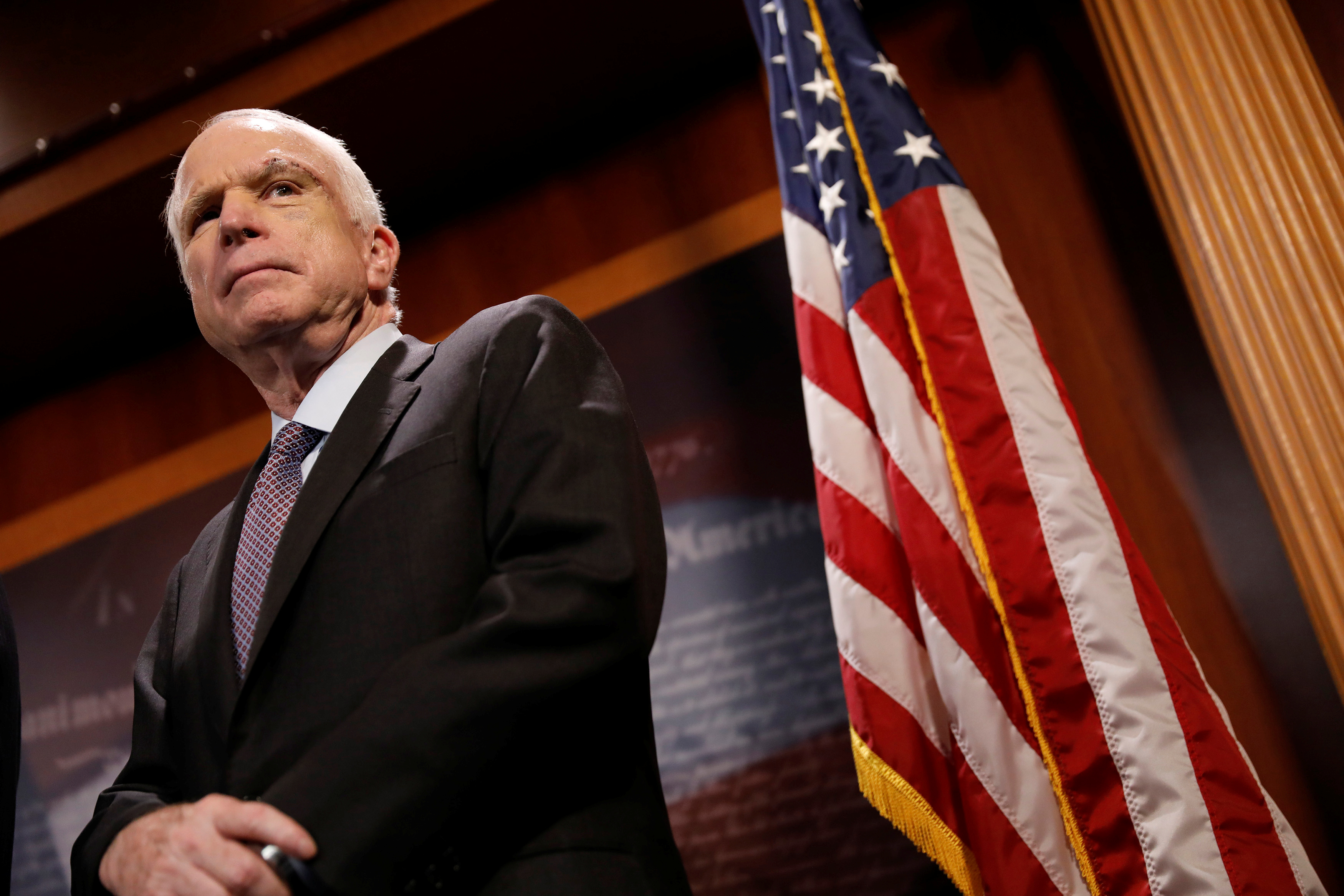McCain saves the GOP
The GOP was ready to commit political suicide over health care. Then the senior senator from Arizona stepped in.


John McCain might have just saved Republicans from committing political suicide — again.
On Friday, the Republican senator from Arizona announced that he could not vote "in good conscience" for the Cassidy-Graham bill, the Senate GOP's last-ditch effort to dismantle the Affordable Care Act. If the two other Republican senators already against this awful piece of legislation hold their ground, McCain will have effectively killed it. Conservatives will surely publicly moan and groan — "McCain strikes again," the Drudge Report announced — but he might have just saved their hides.
The politics of the still-fruitless Republican quest to repeal the ACA have always been confounding. Most Republicans would privately admit that they are trapped between the reality of health-care policy and their own rhetoric — the party has been promising forever to "repeal and replace" the ACA, but Republicans can't come up with a policy that isn't universally loathed and wouldn't do grievous harm to the health-care system. The tension between these two realities has given rise to an absurd political dynamic in which Republicans aggressively pursue repeal legislation while also recognizing that the legislation they want to pass is hot garbage.
The Week
Escape your echo chamber. Get the facts behind the news, plus analysis from multiple perspectives.

Sign up for The Week's Free Newsletters
From our morning news briefing to a weekly Good News Newsletter, get the best of The Week delivered directly to your inbox.
From our morning news briefing to a weekly Good News Newsletter, get the best of The Week delivered directly to your inbox.
This dissonance was on full display in the lead-up to the failed Senate vote to pass the so-called "skinny repeal" of the Affordable Care Act in July. That legislation, which arose out of the Senate GOP's inability to agree on a consensus plan, would have left much of the ACA in place while striking a few key provisions. Republicans were not eager to vote for it, but the desire to do something to "repeal" ObamaCare impelled them to act. To square the circle, several Republican senators said they would vote for "skinny repeal" only if they were promised that the bill would never be signed into law.
"Skinny repeal" collapsed quite dramatically when McCain voted against it on the Senate floor, but not before several vulnerable Republican Senate incumbents voted to pass it. One of those incumbents, Sen. Dean Heller (Nev.), told reporters after the vote that he was "pleased" that the ObamaCare repeal legislation he voted for had failed. So Republicans understand at some level that there will be a political backlash for voting to trash the health-care system, but they keep trying to do it anyway because they promised they would.
That brings us back to Graham-Cassidy, a far more destructive piece of legislation than the repeal bills that came before it. For the moment, this ruinous legislation looks moribund, but the fact that it stood even a chance of passing is a testament to the GOP's willingness to sabotage itself politically in deference to its myopic need to "repeal and replace" ObamaCare.
Even Republican senators who supported Graham-Cassidy said that it was not a good piece of legislation. They also said that they didn't particularly care and that voting to pass a "repeal" was a more important consideration than passing a good bill. "This is not the best possible bill — this is the best possible bill under the circumstances," Sen. Pat Roberts (R-Kan.) told Vox. "If we do nothing, I think it has a tremendous impact on the 2018 elections. And whether or not Republicans still maintain control and we have the gavel."
A free daily email with the biggest news stories of the day – and the best features from TheWeek.com
Sen. Chuck Grassley (R-Iowa) was just as straightforward. "I could maybe give you 10 reasons why this bill shouldn't be considered," he told reporters last week. "But Republicans campaigned on this so often that you have a responsibility to carry out what you said in the campaign. That's pretty much as much of a reason as the substance of the bill."
That's an absurd assessment of Graham-Cassidy, given that "the substance of the bill" would unleash health-care chaos nationwide and strip coverage from tens of millions of people. States that expanded Medicaid under the Affordable Care Act would see their federal funding levels gutted, and every state would have just two years to set up its own health-care system — a task that just isn't realistic given the complexities of health-care policy and the funding uncertainties baked into the legislation. People with pre-existing conditions who now enjoy protections against denial of coverage could have found themselves once again at the mercies of medical underwriters. Annual health-care costs for seniors could have spiked by as much as $16,000.
The party that votes to inflict that sort of havoc on the health-care system will invite electoral retribution from an electorate that (as past midterm elections have demonstrated) is acutely sensitive to health-care politics. But Republicans were gearing up to do exactly that because they're trapped by their own rhetoric and don't know what else to do. Graham-Cassidy is a ruinous piece of legislation and everyone seems to recognize that at some level. But it's something, and for most Republicans in Congress that's good enough.
They might not say so publicly, but if this bill goes down, they all owe McCain a huge favor.
Simon Maloy is a political writer and researcher in Washington, DC. His work has been published by The Huffington Post, The American Prospect, and Salon.
-
 World’s oldest rock art discovered in Indonesia
World’s oldest rock art discovered in IndonesiaUnder the Radar Ancient handprint on Sulawesi cave wall suggests complexity of thought, challenging long-held belief that human intelligence erupted in Europe
-
 Claude Code: the viral AI coding app making a splash in tech
Claude Code: the viral AI coding app making a splash in techThe Explainer Engineers and noncoders alike are helping the app go viral
-
 ‘Human trafficking isn’t something that happens “somewhere else”’
‘Human trafficking isn’t something that happens “somewhere else”’Instant Opinion Opinion, comment and editorials of the day
-
 The billionaires’ wealth tax: a catastrophe for California?
The billionaires’ wealth tax: a catastrophe for California?Talking Point Peter Thiel and Larry Page preparing to change state residency
-
 Bari Weiss’ ‘60 Minutes’ scandal is about more than one report
Bari Weiss’ ‘60 Minutes’ scandal is about more than one reportIN THE SPOTLIGHT By blocking an approved segment on a controversial prison holding US deportees in El Salvador, the editor-in-chief of CBS News has become the main story
-
 Has Zohran Mamdani shown the Democrats how to win again?
Has Zohran Mamdani shown the Democrats how to win again?Today’s Big Question New York City mayoral election touted as victory for left-wing populists but moderate centrist wins elsewhere present more complex path for Democratic Party
-
 Millions turn out for anti-Trump ‘No Kings’ rallies
Millions turn out for anti-Trump ‘No Kings’ ralliesSpeed Read An estimated 7 million people participated, 2 million more than at the first ‘No Kings’ protest in June
-
 Ghislaine Maxwell: angling for a Trump pardon
Ghislaine Maxwell: angling for a Trump pardonTalking Point Convicted sex trafficker's testimony could shed new light on president's links to Jeffrey Epstein
-
 The last words and final moments of 40 presidents
The last words and final moments of 40 presidentsThe Explainer Some are eloquent quotes worthy of the holders of the highest office in the nation, and others... aren't
-
 The JFK files: the truth at last?
The JFK files: the truth at last?In The Spotlight More than 64,000 previously classified documents relating the 1963 assassination of John F. Kennedy have been released by the Trump administration
-
 'Seriously, not literally': how should the world take Donald Trump?
'Seriously, not literally': how should the world take Donald Trump?Today's big question White House rhetoric and reality look likely to become increasingly blurred
